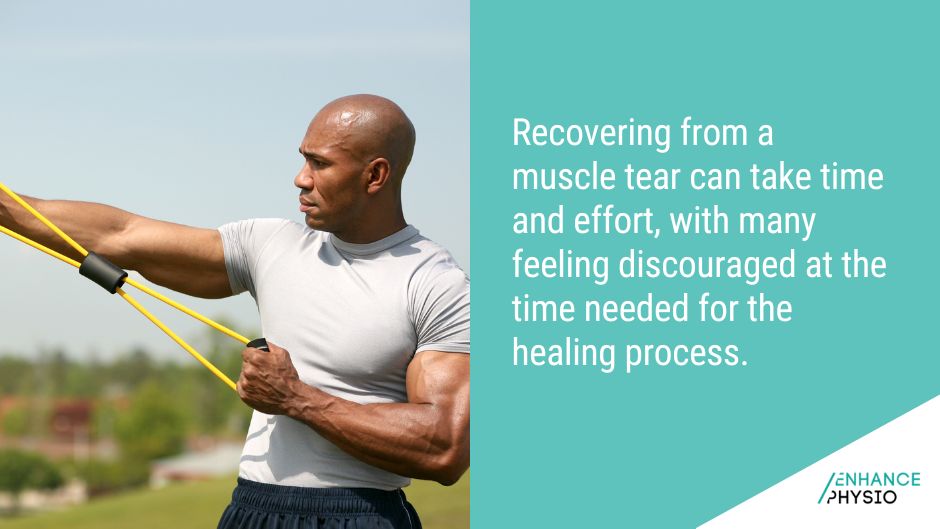It is not uncommon for athletes and active people to suffer from muscular tears. A muscle tear usually occurs when stress is placed on the muscle beyond what it can safely endure. It results in pain, swelling and spasms that may reduce mobility until the injury heals properly.
Although suffering from a muscle tear can be painful and uncomfortable, one should take several key steps to aid recovery.
Recovering from a muscle tear can take time and effort, with many feeling discouraged at the time needed for the healing process. Even minor errors during this critical period can result in further muscle deterioration or re-tearing.
You must know the four biggest mistakes you can make during recovery to maximise your healing potential after suffering a muscle tear. Here are those four mistakes — and how to avoid them — so you can heal quickly and correctly.
1. Stretching too far
When a muscle tear occurs, the torn fibres mend and reconnect. During this process, over-stretching of healing tissue can hamper recovery or cause further damage if done too soon. As such, it’s essential to exercise caution during the early stages of recovery to avoid unnecessary setbacks.
Although slight stretching/movement a few days following an injury can be beneficial, speaking with your physiotherapist before doing so is essential, making sure that you are not extending too much and inadvertently injuring yourself further.
You can safely load the tendon with gradual stretching exercises when recovery is well underway. If these exercises are done correctly and controlled, they can help restore the tendon’s range of motion and flexibility while strengthening muscles.

2. H.A.R.M
We all recognise the R.I.C.E formula for managing an acute injury – rest, ice, compress and elevate the affected area to reduce swelling promptly after sustaining trauma.
Few people know the acronym H.A.R.M, which stands for what you should avoid after an injury: heat, alcohol, running/re-injury or massage – all activities that can further worsen the swelling and pain resulting from a damaged area within 48-72 hours post-injury!
Heat: Should be used with caution when dealing with an injury, as it can cause any existing blood vessels to expand and lead to increased bleeding and swelling. Hot baths or heat rubs such as balms are best avoided in these cases.
Alcohol: Like heat, alcohol boosts blood flow and slows down healing. So if you’ve just had an injury, it’s best to abstain from drinking alcohol.
Running/Re-injury: Too much exercise can impede the healing process of injured tissues. The stress that running puts on an injury causes it to restart bleeding, and re-injury occurs when a person resumes the activity responsible for their initial wound.
Massage: Stimulating the injured area via massage will promote blood flow and amplify swelling.
3. Failure to consult a physiotherapist
We want to point out that seeking assistance from a physiotherapist is essential if you are recovering from muscle strain. A professional can help maximise your chances of recovery and devise an appropriate rehab program for optimal results.
Although diagnosing a muscle tear may appear simple, there is usually more to it than meets the eye. Conditions similar to muscle tears can be misdiagnosed. Sometimes an underlying issue like weakness or pathology could have caused the injury in the first place. You need to consult a physiotherapist to identify your condition and accurately ensure complete recovery.
Your physiotherapist is well-positioned to pinpoint any risk factors that could cause further harm and work towards restoring your tissue to its optimal state.
4. Resuming sports too soon
One of the most intriguing aspects of muscle tears is that even though they aren’t fully healed, the discomfort can significantly reduce. Unfortunately, numerous people sustain another tear from resuming sports prematurely.
Although your body may be in perfect condition again, the muscle fibres might still require some healing time. So, you’ll need to test out your injury slowly and cautiously by starting with low-impact exercises before venturing into more intense physical activities. Doing so will guarantee a successful recovery from any tears or strains.
Your physiotherapist can provide you with a detailed rehabilitation program to help rebuild muscle strength, flexibility, and control for the long term. This will also keep your muscles healthy and free from any future injury or damage.

Final thoughts on muscle tears
Making a full recovery from a muscle tear involves more than rest. It is essential to have the right treatment plan in place to ensure your injury heals appropriately and efficiently.
The most crucial step to take when recovering from a muscle tear is understanding the fundamental principles of rehabilitation. Furthermore, you must know the four biggest mistakes you can make during muscle tear recovery.





